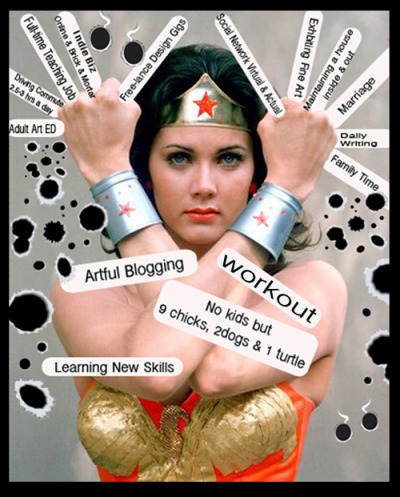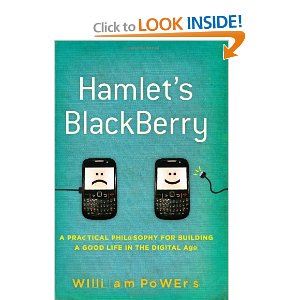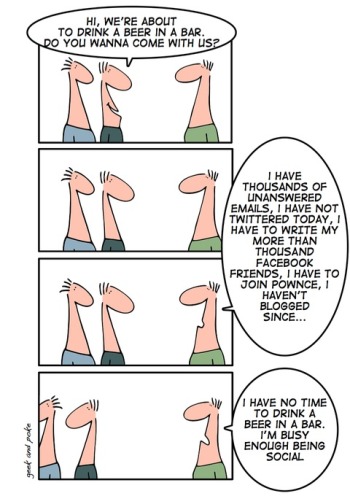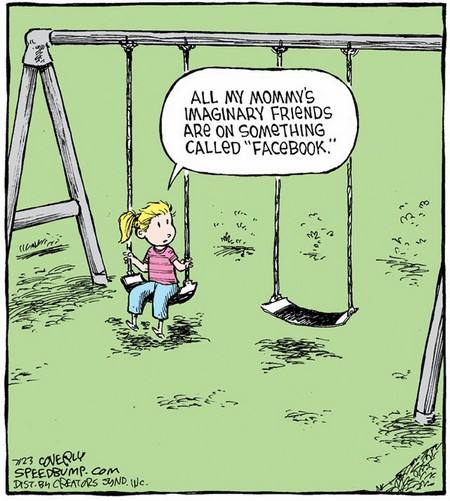Doing Nothing, Disconnecting and Why it's Important (Just in Time For Summer)
 Wednesday, June 15, 2011 at 10:19PM
Wednesday, June 15, 2011 at 10:19PM "Every now and then go away, have a little relaxation, for when you come back to your work your judgment will be surer. Go some distance away because then the work appears smaller and more of it can be taken in at a glance and a lack of harmony and proportion is more readily seen."- Leonardo DaVinci
 The Sweetness of Doing Nothing by m.diaz
The Sweetness of Doing Nothing by m.diaz
Not so long ago, I was not me. I was instead an inanimate object. To be clear, I was a rubber-band. I was stretched so thin from being pulled in so many directions that I was bound to snap, and I did. I snapped right in the face of some folks that I care deeply about. Folks who didn't even have a hand in stretching me to begin with, but unfortunately, they were close enough to feel my whiplash.

Now sometimes being stretched that thin is an aid in productivity. I successfully argue that point at every moment in which I accept a new task. In fact, I've just pitched the, "No Worries, I work better under pressure" tagline to myself and my co-workers, friends and students earlier today.
Come on lets face it, I have a superhero complex, ever since I saw that star-studded Chicana, Lynda Carter spin her brunette head into the Wonder Woman of my dreams.
So I'm super capable and yes I can, I can do it all... sound familiar??
But what I've been learning as I get older is not to ask, "Can I?", (because I probably can, but at what cost?) instead I need to ask, "Should I?"

So in lieu of this global race against time, productivity and efficiency, many of us have grown digital appendages that allow us to redefine multi-tasking: cell & smart phones, laptops, ipads, portable hotspots, apps, etc.
As a result, these appendages have become indispensable, and have us 'connected' indefinitely. Personally, if you ask me, the very thought of misplacing my iphone brings cold-sweats, chills and dizziness to mind instantaneously as though it equated a lost limb.
In the New York Times bestseller, Hamlet's Blackberry, William Powers does an astute job of reminding us that the goal of all of our highly efficient technological advances was to gain us more time. It is the 'spaces, gaps, the respites,and stopping places for the mind' that we gain from our ultra-efficiency that we are somehow losing. Despite all of our hyper-connectivity, we are less connected to authentic humanity by constantly being wired to a virtual one.

First I would like to define rest by including anything that alleviates action and restores absorption of the mental, physical, emotional and/or spiritual kind. If you’re like me, you’ll stress about making it to Yoga class on time, and well, that's just not ok.
Somehow we are all hearing ourselves say WE USED to have A LOT more time...
Now seeing as we now have all of these hyper-connective tools that allow us to do multiple tasks at once, we should have MORE time. Yet, instead if you're like me, you're most likely giving all that new found time away. Possibly that new time is being given away to being 'ON' and available in our digital personas/virtual worlds 24/7. If that's the case, well then I think it might be time to reassess our priorities.
Thoreau said that the man that goes back to the post office (substitute email in-box here) over and over is a man who hasn't heard from himself in a long while.- From Hamlet's Blackberry
So why are these pauses, GAPS of Absorption and PROCESS, these 'moments' or if we dare, DAYS of rest in our busy lives so important?
Well we've all heard the cliché answers: relieving stress, recharging your battery, richer connection and self-reflection. These are indeed vital and incredibly important in gaining the depth/richness and quality of experience we need out of our daily lives (instead of being automatons of brainless routines).
But lets look at some of the rich reasons that I gleaned from Hamlet's Blackberry...
Creativity is defined by the ability to make mental associations ....
" When work is all about darting around screens, we're not doing something thats even more valuable than thinking quickly: thinking creatively.Of the minds many aptitudes, the most remarkable is its power of association, the ability to see new relationships among things. The brain is the most amazing associative device ever created, with its roughly one hundred billion neurons connected in as many as a quadrillion different ways- more connections than there are stars in the known universe.
Digital devices are, in one sense, a tremendous gift to the associative process because they link us to so many sources of information. The potential they hold out for creative insights and synthesis is breathtaking. The best human creativity, however, happens only when we have the time and mental space to take a new thought and follow it wherever it leads. William James once contrasted 'the sustained attention of the genius, sticking to his subject for hours together,' with the 'commonplace mind' that flits from place to place. geniuses are rare, but by using screens as we do now, constantly jumping around we're ensuring that all of us have fewer ingenious moments and bring less associative creativity to whatever kind of work we do."
- William Powers From Hamlet's Blackberry

In working out and toning your body, muscles need states of strict rest in order to grow and develop. As an educator it is established that in order to learn we need to time to process. Within inter-personal relationships we need time for reflection. As humans we live dichotomously between an inward and outward states and that condition should be balanced. I personally feel we lose control when we do anything in excess and the only true form of satisfaction comes in a perpetual balanced state of moderation. It is how I have come to champion my body this year.
William Powers doesn't advocate disconnect and be a ludite. He advocates the notion that we need to learn to control the aspects of our lives that are controlling us- he advocates moderation and mitigation between you and the technologies that are inhibiting your ability to live a high quality, present, attentive and fully immersed experience of a life- learn when to turn your ON 'green' button OFF in order to truly be ON.
He that can take rest is greater than he that can take cities. - Benjamin Franklin
So if I haven't convinced you yet to take a reading gander with Hamlet's Blackberry, let me add some previews of what's in store. Powers takes on the challenging task of reviewing the philosophies of seven great thinkers throughout human history. He applies their thinking of what had once been the new technologies of their time and the concept of connectivity to today's surge of overwhelming digital data. You might think this is a far reach, but I found it pleasantly surprising to see how relevant and applicable: Plato's notion of 'distance' is, Seneca's concept of Inner space, Gutenberg's manufacturing brilliance with technologies of Inwardness, Shakespeare's idea that old tools can ease overload, Ben Franklin's adaptation of positive rituals, Thoreau's Walden zones, McLuhan's lowering of the Inner thermostat and William Power's Internet Sabbath. These ideas can apply to you and me and help us moderate our on 24/7 consumption of digital juice.
Finally, if these thoughts don't stimulate your desire to ignite your spatial, tactile and physical awareness with the reality around you, here are some tech-saavy reasons that are not meant to be comical (though they may sound it) to self-moderate your digital connections.

TAKE YOUR REST AND LEARN TO SAY NO & shut off & time out & DISCONNECT every once in a while so you don't get things like:
- INFORMATION OVERLOAD estimated to be responsible for economic losses (lowered productivity and throttled innovation) of 900billion dollars a year *(result of a 2009 study done by Basex a leading research firm)
- ATTENTION DEFICIT TRAIT (ADT) symptoms include distractability, restlessness, a sense of gotta go gotta rush, gotta run around and impulsive decision making because you have so many things to do
- CONTINUOUS PARTIAL ATTENTION defined as the state of mind in which most of ones attention is on a primary task, but where one is also monitoring several background tasks just in case something more important or interesting comes up
- EMAIL APNEA a form of shallow breathing while checking email that in some extreme cases leads to an increase in stress related disease
- INTERNET ADDICTION DISORDER self-explanatory damage...
- NOMOPHOBIA Fear of being without mobile phone contact
Next, plan your day of rest. It can be any day of the week. Planning is essential to progress. Carve out time and you’ll commit. Practice turning down events, errands, chores, things you don’t truly need to get done under the gun. Plan meals in advance, turn off the iPhone, disconnect your computer, and stick your car keys in a drawer. Instead of being a slave to time, create it by accepting downtime. By taking time out, you’ll have more in the end.























 Stumble It!
Stumble It!